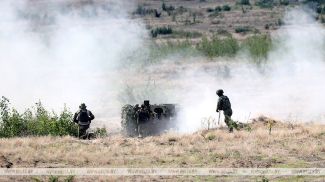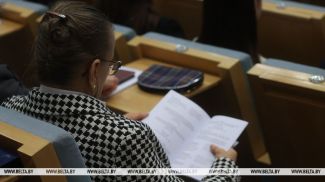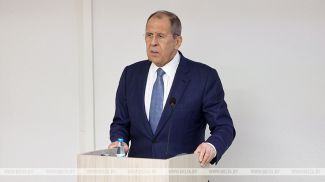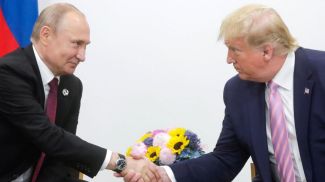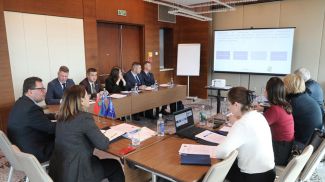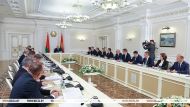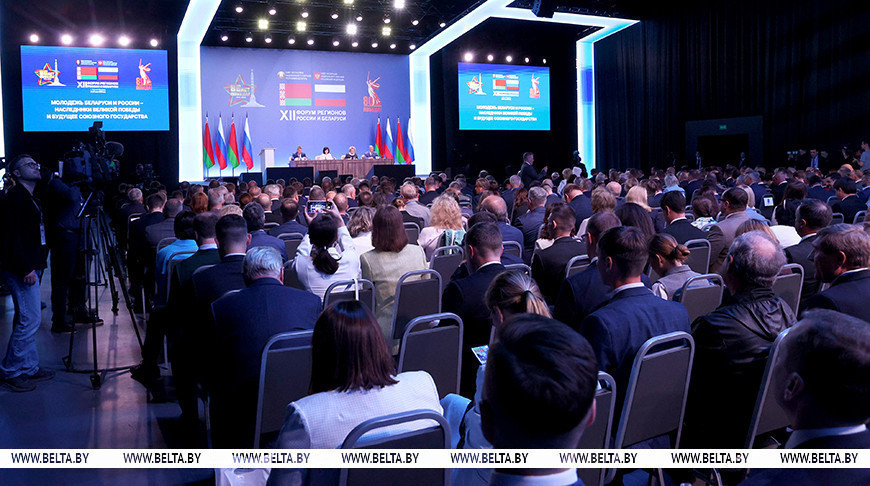
NIZHNY NOVGOROD, 27 June (BelTA) – The West is waging a hybrid war against Belarus and Russia in economy, politics, and the information space, Chairperson of the Council of the Republic of the National Assembly of Belarus Natalya Kochanova said at the plenary session of the 12th Forum of Regions of Belarus and Russia, BelTA has learned.
“Our countries are now confronting the united West that is rewriting history, waging a hybrid war against us in the economy, politics and the information space. Attempts by external forces to drag young people into destructive activities and impose false values on them have pushed us to develop new joint approaches to youth policy that are based on patriotism, a common understanding of historical processes, and a vision of the future of the Union State,” said Natalya Kochanova.

“Our countries are now confronting the united West that is rewriting history, waging a hybrid war against us in the economy, politics and the information space. Attempts by external forces to drag young people into destructive activities and impose false values on them have pushed us to develop new joint approaches to youth policy that are based on patriotism, a common understanding of historical processes, and a vision of the future of the Union State,” said Natalya Kochanova.
“Today, we see a struggle not for the future, but for the past. After all, by cutting off the roots, it is easy to destroy the foundation of any state and society,” the speaker noted.

“At the end of last year, we signed the Union State youth policy roadmap that synchronized the fundamental areas of interaction between government agencies and public associations. The document is designed to develop human potential and provide comprehensive support for youth initiatives, protect them from bad influence, drug addiction, extremism and bullying, as well as to counteract terrorism and violence, and to preserve historical memory,” she noted.
“In Belarus, historical memory is protected by the state. This is spelled out in the updated Constitution, in the laws on preventing the rehabilitation of Nazism and documents on the genocide of the Belarusian people. The criminal case on the genocide of the Belarusian people, which is being investigated by the Prosecutor General's Office, has become a legal shield against misinterpretation of the outcomes of the war. It will take time to process new evidence that has revealed that the number of burned villages that mirrored the fate of Khatyn, the number of mass graves and victims is larger than was previously believed. After all, in the Trostenets death camp near Minsk, the remains of more than half a million prisoners of war and civilians were found, well above the previous estimates of 200,000. And, judging by how the investigation is proceeding, the president of the Republic of Belarus did not rule out the possibility that the new evidence might show that half the population died on our land,” the chairperson of the Council of the Republic emphasized.
“As the memory of the Great Patriotic War is fading, we are seeing an increase in hostility from those liberated from the fascist yoke. Fewer and fewer countries share our determination to fill in the blank spots in history. But the more our opponents try to conceal the truth, the stronger our resolve should be to expose it. While speaking at the international patriotic forum in Volgograd, President Aleksandr Grigorievich Lukashenko said that the younger generation should know that this war was not just a fight for territory, but an existential struggle. It will be a responsibility of the young generation to build a new security architecture, to protect freedom and defend the right to political, cultural and economic sovereignty. The state should support young people in their transition to adulthood and provide a foundation for a confident future, lay down the right guidelines based on facts, not on falsehoods,” Natalya Kochanova noted.
“In Belarus, historical memory is protected by the state. This is spelled out in the updated Constitution, in the laws on preventing the rehabilitation of Nazism and documents on the genocide of the Belarusian people. The criminal case on the genocide of the Belarusian people, which is being investigated by the Prosecutor General's Office, has become a legal shield against misinterpretation of the outcomes of the war. It will take time to process new evidence that has revealed that the number of burned villages that mirrored the fate of Khatyn, the number of mass graves and victims is larger than was previously believed. After all, in the Trostenets death camp near Minsk, the remains of more than half a million prisoners of war and civilians were found, well above the previous estimates of 200,000. And, judging by how the investigation is proceeding, the president of the Republic of Belarus did not rule out the possibility that the new evidence might show that half the population died on our land,” the chairperson of the Council of the Republic emphasized.
“As the memory of the Great Patriotic War is fading, we are seeing an increase in hostility from those liberated from the fascist yoke. Fewer and fewer countries share our determination to fill in the blank spots in history. But the more our opponents try to conceal the truth, the stronger our resolve should be to expose it. While speaking at the international patriotic forum in Volgograd, President Aleksandr Grigorievich Lukashenko said that the younger generation should know that this war was not just a fight for territory, but an existential struggle. It will be a responsibility of the young generation to build a new security architecture, to protect freedom and defend the right to political, cultural and economic sovereignty. The state should support young people in their transition to adulthood and provide a foundation for a confident future, lay down the right guidelines based on facts, not on falsehoods,” Natalya Kochanova noted.




